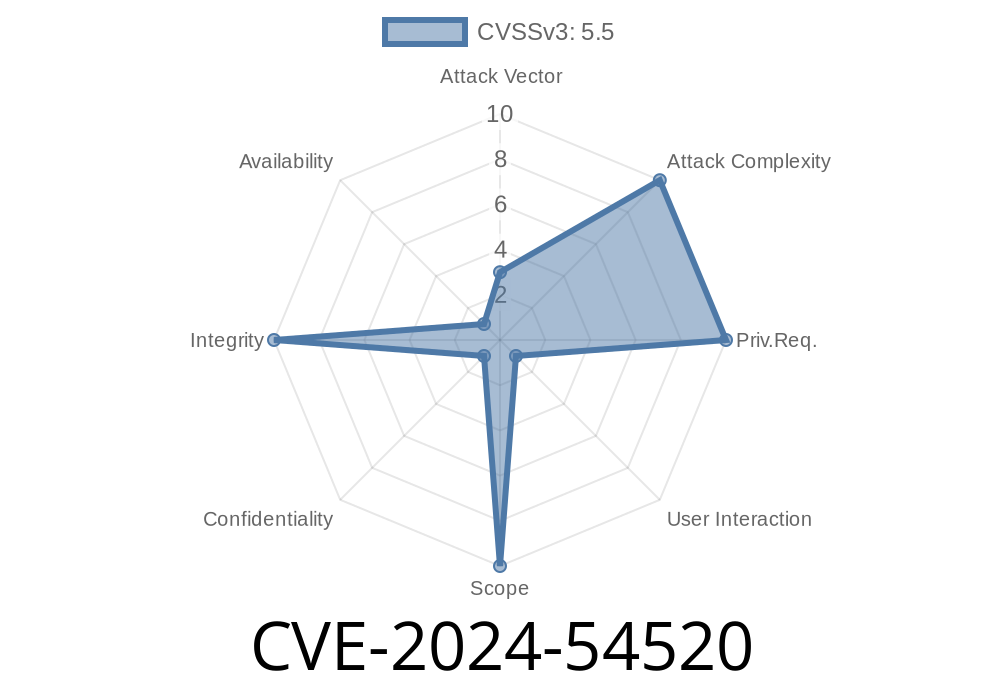In July 2024, Apple patched a serious path handling vulnerability tracked as CVE-2024-54520. This issue affected multiple versions of macOS, including Sonoma, Sequoia, and Ventura. The bug could let a malicious app overwrite any file on the system that the current user could access. This post breaks down how the vulnerability worked, with example code, links to original references, and an outline of possible exploit steps.
CVE: CVE-2024-54520
- Component: macOS kernel / filesystem utilities
Apple described the bug in their security notes
> "A path handling issue was addressed with improved validation. An app may be able to overwrite arbitrary files."
This means insufficient checks around file paths allowed malicious apps to trick the system into writing data where it shouldn't—potentially leading to privilege escalation or persistent malware.
How the Exploit Works
Imagine a program that saves user data to disk. Normally, it should only write files in specific, safe locations. If the app lets you choose the path or filename, but doesn’t carefully check or clean up the input, an attacker could supply special path elements like ../ (directory traversal), symlinks, or absolute paths. If the software does not validate the path, it could end up writing to, say, .bashrc, ~/Library/LaunchAgents/com.apple.loginwindow.plist, or even system binaries.
Here’s a simplified example in Python to show the _concept_
def save_user_data(filename, content):
with open(filename, "w") as f:
f.write(content)
If you call save_user_data('../../.bash_profile', 'evil code'), and save_user_data() doesn’t check the input, it would overwrite your ~/.bash_profile file.
On macOS, the affected system component likely handled paths without restricting where apps could write files, allowing a similar attack.
Vulnerable Logic
# Vulnerable version (no path validation)
import os
def save_report(user_input_filename, report_data):
path = os.path.expanduser(user_input_filename)
with open(path, 'w') as f:
f.write(report_data)
# Malicious user input
save_report('/Users/your_username/.zshrc', 'Evil export PATH...')
Safe (Patched) Version
# Patched version with validation
import os
def save_report(user_input_filename, report_data):
safe_dir = '/Users/your_username/Documents/MyAppReports'
abs_path = os.path.abspath(os.path.join(safe_dir, user_input_filename))
# Ensure file stays in the safe directory
if not abs_path.startswith(os.path.abspath(safe_dir)):
raise ValueError("Invalid file path!")
with open(abs_path, 'w') as f:
f.write(report_data)
Result: Now, the code only allows writing inside MyAppReports; arbitrary files are safe.
How Attackers Could Exploit CVE-2024-54520
If a vulnerable macOS system lets a regular user app create, overwrite, or symlink to sensitive files without correct path checks, malicious apps could:
1. Overwrite user config files: Insert startup scripts/commands into .bash_profile, .zshrc, etc.
2. Plant launch agents: Place files in ~/Library/LaunchAgents to run at login.
Tamper with app preferences: Break or modify other users’ app settings.
4. Manipulate system files (if root or with the right permissions): Overwrite system binaries or key configuration files, leading to privilege escalation or persistence.
Patch with Sonoma 14.7.2, Sequoia 15.2, Ventura 13.7.2 or later.
References
- CVE-2024-54520 at NVD
- Apple security content for macOS updates
- Apple’s general security updates
Closing Thoughts
CVE-2024-54520 is a reminder that file path validation is critical. Left unchecked, it can undermine not just app security but the entire OS—especially when “sandboxed” apps find a way to touch the wrong files. Always keep your system patched and be careful with programs that handle files in user-writable locations.
If you’re a developer: Never trust file path inputs blindly.
If you’re a regular user: Update now, and only install apps from trusted sources—bad apps sometimes sneak past the App Store review for a while.
*Stay safe, and until next time, keep your system up to date!*
Timeline
Published on: 01/27/2025 22:15:13 UTC
Last modified on: 03/03/2025 22:45:38 UTC
